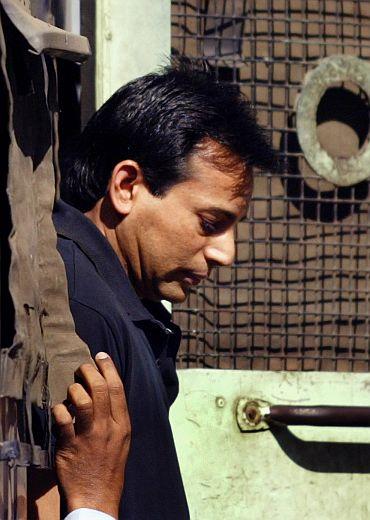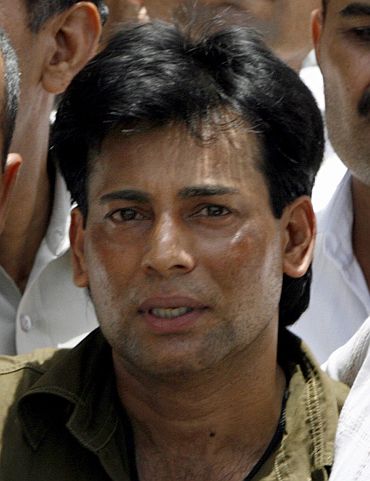Photographs: Punit Paranjpe/Reuters Toral Varia in Mumbai
The Portugal high court has ordered revocation of the extradition of underworld don Abu Salem accusing Indian probe agencies of violating the conditions under which he was permitted to be taken to India in November 2005 to face trial in eight cases including 1993 Mumbai blasts.
At the time of Salem's extradition six years ago, Indian government had given an assurance to Portugal that he would not be given death penalty or charged with any section of law which entails jail for more than 25 years.
Abu Salem's lawyer Advocate Sudeep Pasbola said on Tuesday that a Portugal court has passed an order to terminate the authorisation of Salem's extradition.
According to him the operative part of the order reads, "In view of what has been stated above, judges of third bench of this high court consider that the Indian Union while accusing and judging Abu Salem Qayum Ansari for the fact describes in point of 3 to 8 of the new accusation framed under the case RC-1/93 CBI STF Mumbai violated the principle of specialty as it is understood in the Portuguese legal system reason for which it is consider these act as illegal and decided to terminate authorisation of granted for extradition Of Abu Salem Qayum Ansari."
With inputs from PTI
Please ...
Portugal high court terminates extradition of Abu Salem
Image: Salem is surrounded by policemen as he arrives at a court in HyderabadPhotographs: Krishnendu Halder/Reuters
Salem's counsel had approached the Portuguese high court after the Supreme Court dismissed his plea last year and upheld the a designated TADA court's decision to frame additional charges against Salem for 1993 Mumbai blasts in addition to the other grave charges for which he was extradited by Portugal government to face trial in India.
If India fails to convince the Portuguese judiciary Salem may have to be sent back to a jail in Lisbon.
However, the Central Bureau of Investigation will file an appeal through the Ministry of External Affairs. A CBI spokesperson told rediff.com, "Earlier as well Abu Salem had filed a similar case in the SC which was rejected by the court. The current order from the Portugal court is only a matter of interpretation."
Salem, the prime accused in 1993 Mumbai serial blasts along with his girlfriend Monica Bedi, were extradited to India on November 11, 2005, after a tortuous legal process in Portugal lasting three years.
Portugal high court terminates extradition of Abu Salem
Image: Salem leaves a court in New DelhiPhotographs: Adnan Abidi/Reuters
The extradition of Salem, who is also wanted in various cases including the murder of noted film producer Gulshan Kumar besides his role in 1993 blasts masterminded by Dawood Ibrahim, came after an assurance by Indian government to Portugal that he would not be given death penalty, an important requirement in extradition proceedings in Europe.
Bollywood starlet Bedi, however, faces trial in connection with two cases of forgery of passport in Bhopal and Hyderabad. She had travelled on forged documents to stay with Salem in Lisbon in the last few years.
The underworld don had been extradited to India in eight cases which included the serial blasts, two cases of forgery of passports from Lucknow, three cases of extortion in Delhi and two murder cases in Mumbai which included murder of Ajit Dewani, secretary of Bollywood actress Manisha Koirala.
Government had in 2003 given the assurance that Salem won't be given death penalty after Portugal refused to entertain India's request as its law held that no person could be extradited to any such country where capital punishment was also a mode of punishment.
Salem was the first successful extradition from any European country to India involving a person accused of committing heinous crimes.
The extradition of Salem, who served 39 months in a Lisbon prison for entering Portugal on a forged document, came close on the heels of a constitutional court of that country turning down his appeal against the extradition order of Supreme Court.
Salem was shifted to Taloja jail a few months ago, following reports of threat to his life.




article